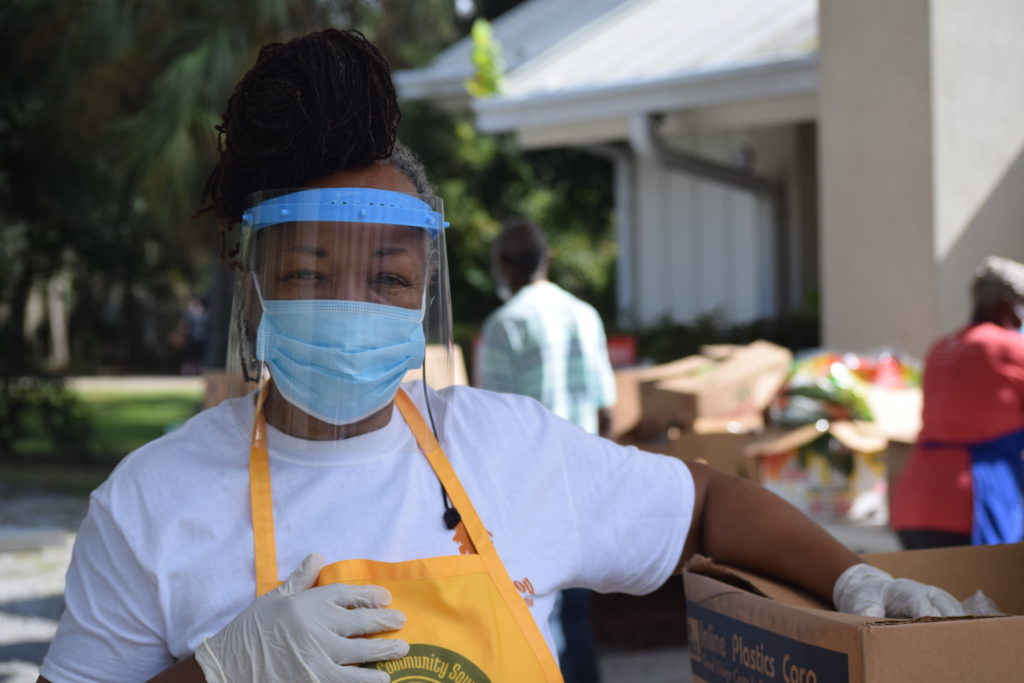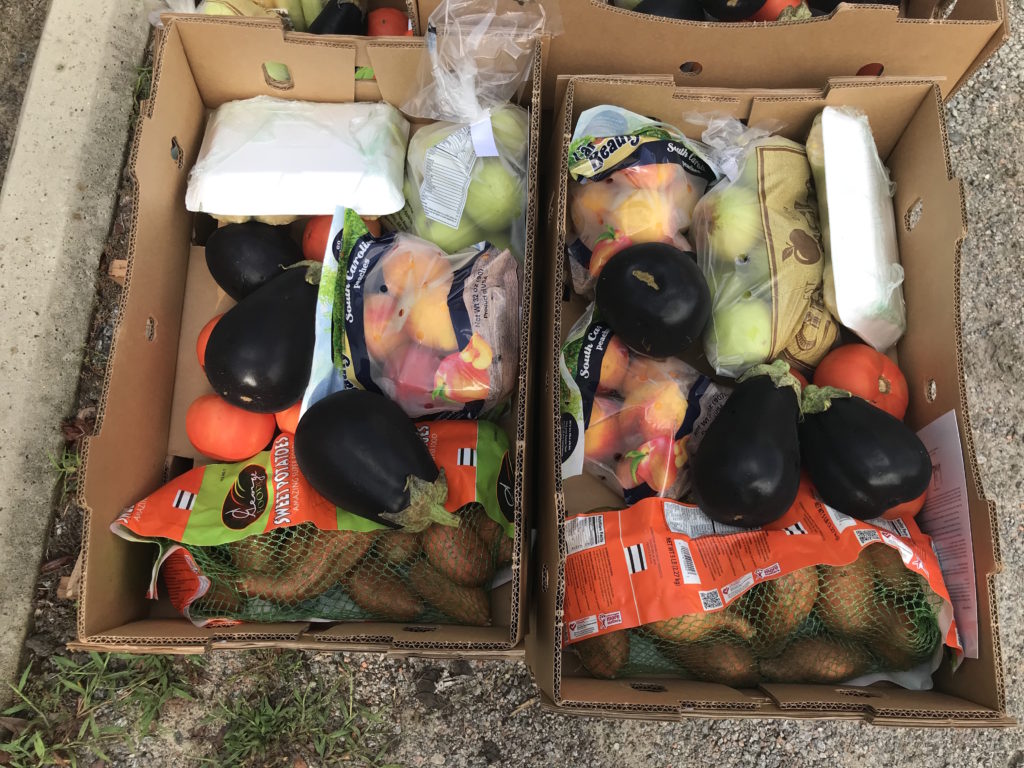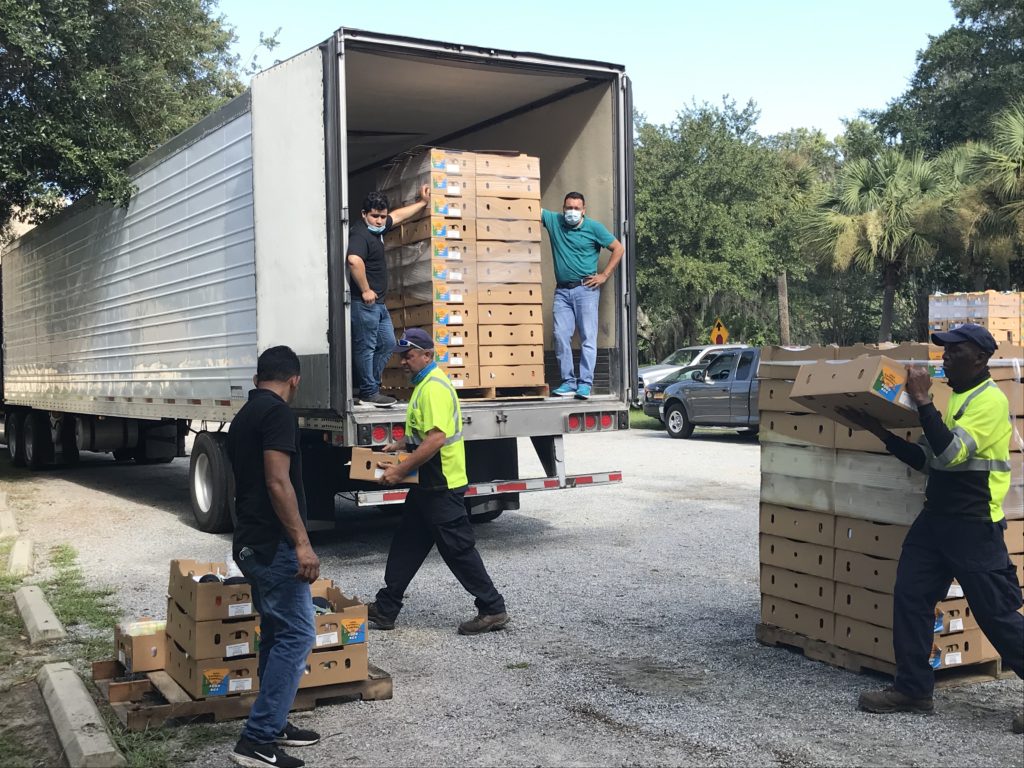BLUFFTON, S.C. — Sunlight filtered through columns of Spanish moss on a recent Thursday morning as two town workers in masks chatted next to the Campbell Chapel AME Church.
Donned with a mask and latex gloves, Constance Martin-Witter, executive director of the Bluffton Community Soup Kitchen, strode out to take temperatures as the town employees and others lined up just past 8 a.m.
Beep.
97.7°F.
Beep.
97.5°F.
Martin-Witter, satisfied with the readings, had people log the numbers in a small spreadsheet. This was food distribution in the age of COVID-19, after all.
For years, Martin-Witter has run the soup kitchen in this coastal town, feeding thousands of people around South Carolina’s Lowcountry, a collection of counties, including historic Charleston, that relies heavily on tourism to fuel its economy.

But the coronavirus pandemic has posed new challenges. Residents from a wider range of socioeconomic classes need help, she said. The deadly pathogen had upended their lives.
“I don’t think it’ll be normal” ever again, she said later, as mosquitos whined through the air, relishing the morning coolness.
Some volunteers, chatting in Spanish at another nearby church, suddenly craned their necks toward an intersection down the block. A tractor-trailer was trundling along Boundary Street, carrying hundreds of fresh fruit and vegetable boxes.
This was the end of the line. A multibillion-dollar federal contracting program, launched to provide relief to families in need amid the pandemic, had brought this truck to this moment in this town, where Martin-Witter was helping cook grits and other food for the team that was about to unload lots of peaches, tomatoes, sweet potatoes and eggplants.
The produce was from Titan Farms Inc., a massive peach grower in Saluda County, S.C., over 150 miles away. The farm recently won a $10 million federal contract — one of the biggest in the state in connection with COVID-19 — to distribute food boxes around the southeast.

The Ridge Spring-based company received the money as part of a sprawling U.S. Department of Agriculture initiative to provide up to $3 billion in healthy food to residents as the coronavirus continues to spread across the country.
Through the program, called “Farmers to Families,” the USDA recently awarded over $200 million in new contracts. It also approved up to $1.27 billion in extended contracts, according to the agency.
The USDA earlier this year spent up to $1.2 billion during the program’s first round of funding, according to the agency, awarding contracts nationwide to big and small companies.
At Titan Farms, the company typically packs two to four pounds of peaches into every box, said Ross Williams, director of packaging operations and food safety. Vegetables, such as onions, potatoes or sweet corn, are also included in the boxes.
By the end of August, Titan Farms had to provide roughly 286,000 fruit and vegetable boxes to various groups in the southeast, he said, amounting to more than 5.2 million pounds of food.
Hundreds of those boxes went to the Bluffton Community Soup Kitchen, almost 15 miles north of the Georgia border.
“There’s no spoilage. … It’s really getting food into areas that normally wouldn’t have those options,” Martin-Witter said.
Before the pandemic, the soup kitchen would serve an average of 20 to 40 shoppers at its weekly indoor food pantry. Today, it’s serving 60 to 75 people per day at a biweekly outdoor pantry, according to Martin-Witter.

The Rev. Gwendolyn Green, pastor at the St. John Baptist Church in Bluffton, pulled up in an SUV as volunteers set a stack of food boxes down outside the Campbell Chapel AME Church. Kids spilled out of her vehicle, racing to pack the boxes into the trunk.
She said the children helped deliver food to shut-ins during the pandemic. A few minutes later, she pulled out of the driveway, gravel crunching as the town’s back-hoe went back and forth, picking up more boxes.
Martin-Witter, the soup kitchen’s executive director, wearing a light blue mask, said the area’s tourism-driven industries had taken a hit over the pandemic summer. Service workers, while maybe back at work, had their hours cut. Some no longer had full-time positions.
“It makes me see that people care,” she said of the Farmers to Families program, watching a handful of volunteers hop in and out of the tractor-trailer. “When people care, lives can change.
“Small groups like this are all over the place,” she added. “Sometimes people don’t know the impact.”
As she spoke, a line of trucks snaked around the church, waiting to pick up food from that day’s delivery.
Sam Ogozalek covers COVID-19 recovery efforts for The Island Packet in Hilton Head, S.C.. This dispatch is part of a series called “On the Ground” with Report for America, an initiative of The GroundTruth Project. Follow him on Twitter: @SamOgozalek.


































